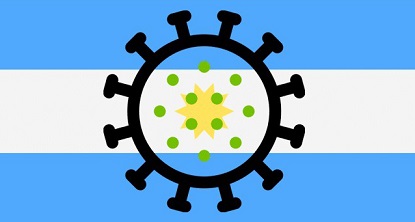COVID-19 News: Argentina Reports Resurgence Of COVID-19 With JN.1 identified As Culprit behind New Wave
Nikhil Prasad Fact checked by:Thailand Medical News Team Jan 10, 2024 2 years, 1 month, 5 days, 22 hours, 12 minutes ago
COVID-19 News: As the world struggles with the ever-evolving landscape of the COVID-19 pandemic, Argentina finds itself at the forefront of a concerning surge in infections.
COVID-19 News reports indicate a notable increase in COVID-19 cases across various regions of the country, including the City of Buenos Aires, the Province of Buenos Aires, Chaco, Jujuy, and Tucumán.
https://www.0221.com.ar/nacional/suben-los-casos-covid-19-argentina-el-impacto-otra-subvariante-n86081
https://www.infobae.com/salud/2024/01/08/aumentan-los-casos-de-covid-en-la-argentina-las-razones-vistas-por-los-expertos/
https://en.mercopress.com/2024/01/10/increase-in-number-of-covid-19-cases-reported-in-argentina
 COVID-19 Resurgence Reported In Argentina
COVID-19 Resurgence Reported In Argentina
Experts attribute this resurgence to the emergence of the JN.1 subvariant, which is currently causing a global wave of infections. This development has reignited fears of a return to stringent lockdown measures reminiscent of those experienced in 2020, particularly as the winter season approaches.
The Rise of JN.1 Subvariant and Its Global Impact
The JN.1 subvariant, a descendant of the BA.2.86 sublineage, has rapidly gained prominence on the global stage. Classified as a variant of concern by the World Health Organization (WHO) on December 18, 2023, JN.1 has become the dominant strain in the United States and Europe, contributing to approximately 70% of sequenced infections worldwide. Notably, this sublineage carries an additional L455S mutation in the coronavirus' Spike protein, potentially making it a more transmissible pathogen.
Epidemiological Data and Concerns
In the last two weeks, Argentina has witnessed a substantial surge in COVID-19 cases. According to data from the National Council for Scientific and Technical Research (Conicet), the average daily infections increased from 84 in the week of December 18-24 to 212 in the week of January 1-7.
However, experts caution that these reported cases represent only a fraction of the actual infections, as limited testing is currently being conducted.
The provinces of Tucumán, Jujuy, Chaco, and the City and Province of Buenos Aires have experienced notable spikes in daily cases. For instance, Tucumán witnessed an increase from 21 average daily cases to 97, while Jujuy saw a climb from 3 to 23 cases per day. Chaco reported an increase from 3 to 11 daily cases, and the Province of Buenos Aires observed a rise from 15 to 34 cases per day. Similarly, the City of Buenos Aires reported an increase fr
om 7 average daily notifications to 17.
https://bancos.salud.gob.ar/recurso/boletin-epidemiologico-nacional-n-685-se-52-2023
Expert Opinions and Calls for Vigilance
Dr Jorge Aliaga, a researcher from Conicet, emphasizes the correlation between periods of case growth in Argentina and the introduction of new variants. In this instance, the JN.1 subvariant is considered a potential cause for the recent surge.
Virologist Dr Humberto Debat explains the origins of JN.1, tracing it back to the BA.2.86 variant, which gained attention due to its genetic divergence and was subsequently classified as a variant of interest by the WHO.
Cardiologist Dr Mario Fitz Maurice underscores the ongoing threat of COVID-19, urging the public to recognize that the pandemic emergency is not over. He advocates for continued vigilance, especially in enclosed and crowded environments, emphasizing the importance of wearing facemasks.
Vaccination and Booster Doses
Experts unanimously stress the significance of vaccination and the urgent need for booster doses. The emergence of new variants heightens the importance of maintaining high vaccination coverage to enhance immunity and mitigate the severity of infections. Despite the challenges posed by the JN.1 subvariant, vaccination remains a crucial tool in the ongoing battle against the pandemic.
Comparative Analysis and Future Concerns
As COVID-19 cases surge in Argentina, experts draw comparisons to previous periods of growth, particularly the significant increase observed in September of the previous year. The current scenario is further complicated by the winter season, which traditionally witnesses an uptick in respiratory infections. Concerns mount as the healthcare system faces increased stress, with Dr Fitz Maurice highlighting the growing number of COVID-19 patients in hospitals.
Conclusion
The resurgence of COVID-19 in Argentina, attributed to the impact of the JN.1 subvariant, underscores the dynamic nature of the pandemic. While progress has been made with vaccinations, the evolving virus necessitates continuous monitoring, adaptability in public health measures, and a concerted effort to promote vaccination and booster doses. As the nation navigates through this challenging period, collaboration between authorities, healthcare professionals, and the public remains crucial in mitigating the impact of the pandemic and safeguarding public health.
For the latest
COVID-19 News, keep on logging to Thailand Medical News.
